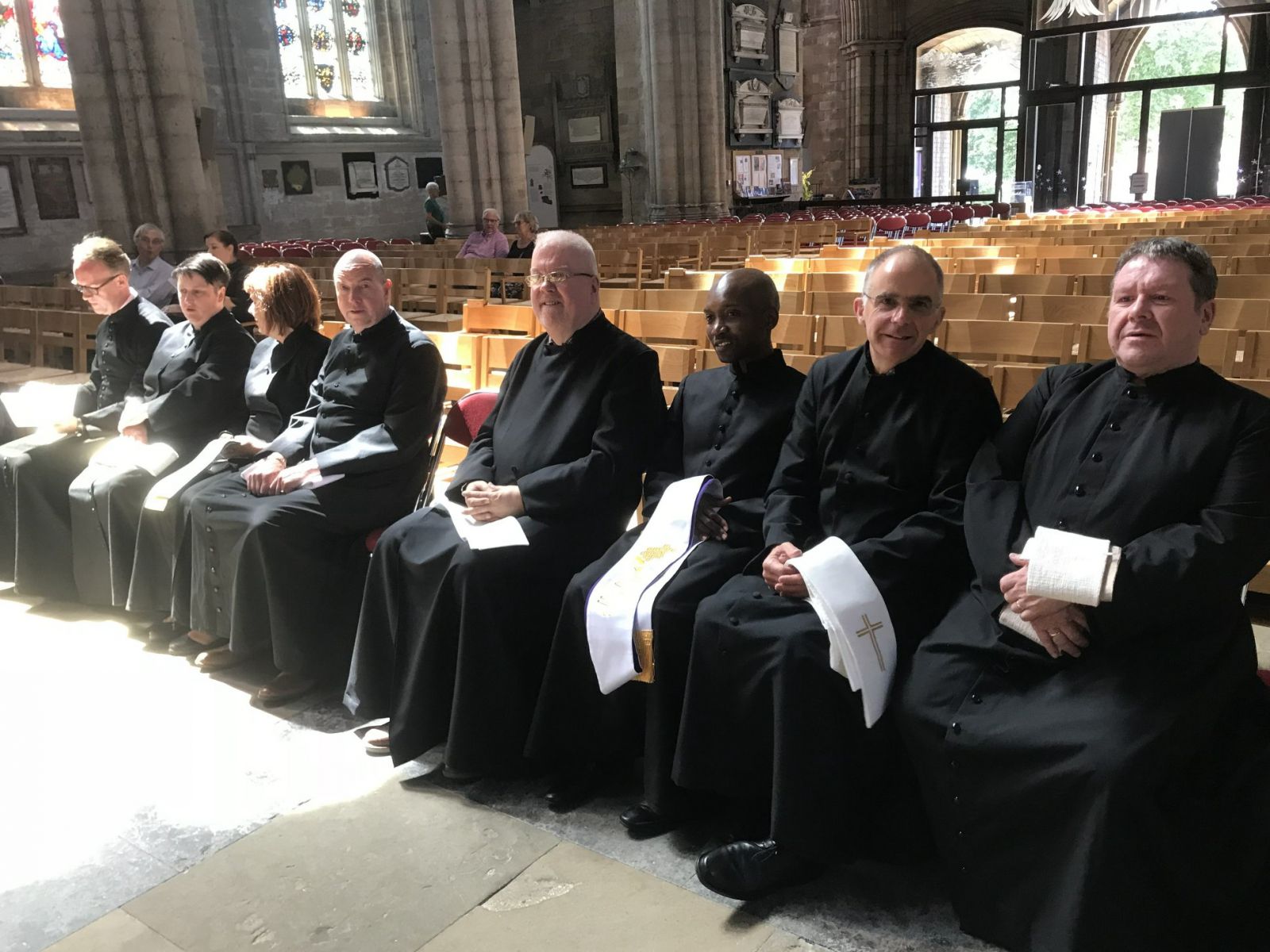The Start
Every Diocese does things slightly differently! This may be for historic reasons, but often it's simply because of the size and history of the diocese involved and the way the Diocesan administration is structured. For most people the first step will involve speaking to your vicar or parish priest.
Many people wrestle with God’s call for some years before finally deciding to mention it to their vicar. There is nothing right or wrong about this and no perfect timescale. But do remember that there are age limits. Don’t leave it too late!
If your vicar thinks that you should explore further, they will send you to meet with someone from the Vocations Team. This is normally done by contacting the Vocations Office. They will ask a few basic questions about your age and where you live etc, then arrange for you to meet the DDV (Director of Vocations), or occasionally one of our team of ADDOs. (ADDO stands for "Assistant Diocesan Director of Ordinands"). We have around twenty Assistant DDOs spread across the Diocese and will try to arrange for you to meet someone fairly near to where you live, although many meetings can be via Zoom.
Your first meeting does not commit you to anything and in fact you can drop out of the process at any point. The first meeting is an opportunity for the DDV or ADDO to get to know you. They want you to be honest and open, and they will be truthful with you about what lies ahead. They are not there to judge you in a critical way, but they are seeking God’s will with you, and will tell you honestly if they have serious doubts.
After the first meeting, if the DDV thinks you should begin the discernment process, they will ask the Vocations Office to send you an “Enquirer’s Form” for you to complete. When the office receives that form they will arrange for references to be taken, normally including your vicar, a work referee, and someone who knows you from your church. An enhanced DBS check is also required before proceeding.
When your references have been received, assuming there’s no significant problem raised by them, you will begin to see your ADDO and continue to see them regularly (every few weeks) through the process. They will want to explore every aspect of your life with you.
The National Shared Discernment Process
Candidates for ordination are assessed by the National Shared Discernment Process. It can take a minimum of a year and involves a number of interviews and other activities, taking place within the Diocese of Leeds and nationally. You can expect to get plenty of support through this, surrounded in prayer, but it can be rightly challenging at times. You are assessed locally (within the diocese) and nationally at two events, known as the Stage 1 Panel and the Stage 2 Panel.
Those assessing you are exploring the qualities you might bring to ministry and will be looking for evidence from what you do, say and write, along with interviews and references from those who know you well.
We are exploring six Qualities across four Domains, building up a three-dimensional picture of you.
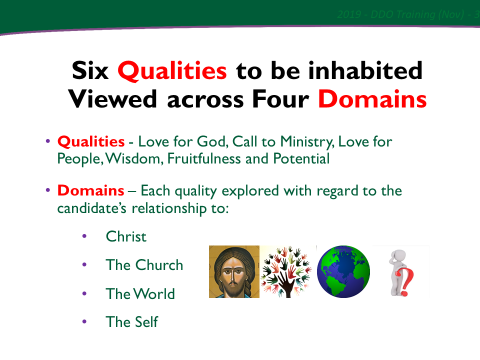
The process begins in the Diocese, where you will meet regularly with a Director of Ordinands (ADDO) – usually every few weeks. The Vocations Team arrange several events each year to help you grow, learn and have helpful experience.
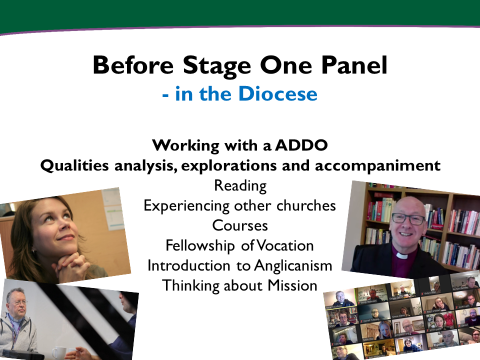
When your ADDO considers you are ready, they will arrange for you to meet your area bishop. This is an important meeting but at this stage you are not expected to be the “finished article”, though they will report back their thoughts to the ADDO. If you are not sure who your area bishop is, your ADDO will help you.
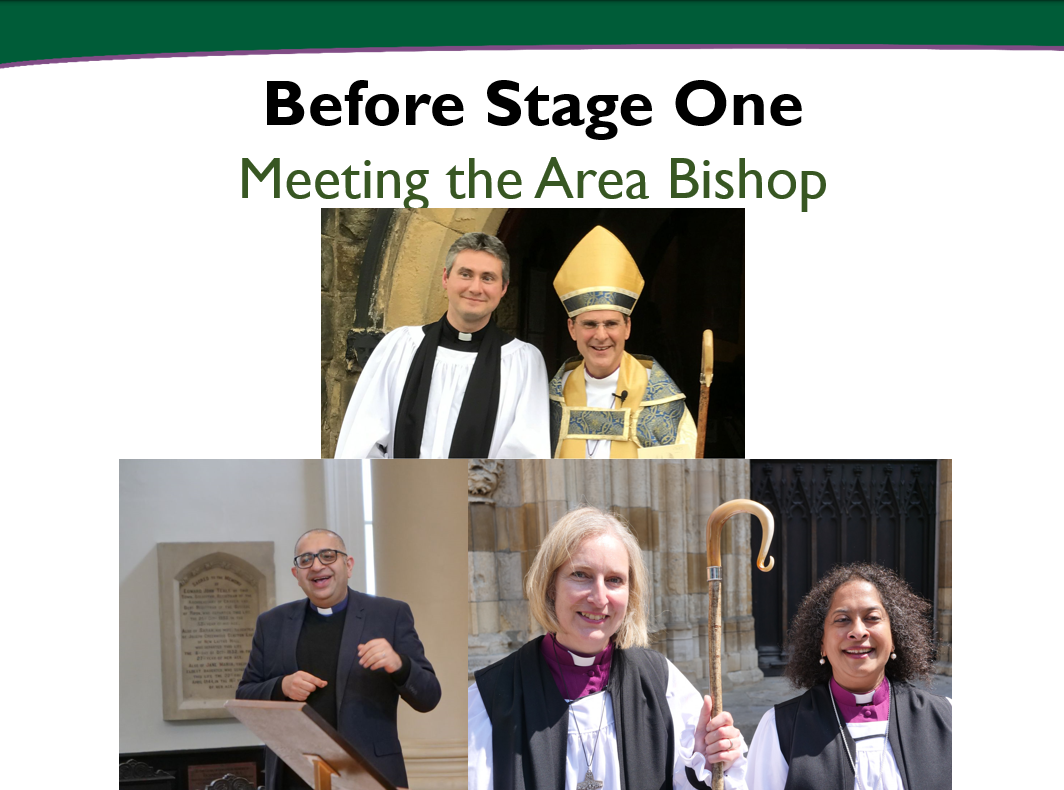
After meeting your area bishop, you will normally be booked into a Stage 1 Panel.
What is a Stage 1 Panel?
The Stage 1 Panel is a nationally-arranged non-residential event which involves several candidates being interviewed, or rather having a conversation with a trained Advisor.This is online via Zoom at present.
- Candidates attend either a morning or an afternoon
- They will be part of a Group of 8
- There are six short “conversations” with Bishop’s Advisors. These are known as the "Carousel Conversations".
- Each ‘station’ will last 15 minutes (with 2 x 15 minute breaks)
- Worship will be centred in the middle of the day, and led by the Advisors. You don't have to lead anything!
What will the six stations cover?
- Vocation to Priesthood/Diaconate
- The Church of England
- Articulating Faith
- Practical and Pastoral Care
- Living as a Disciple
- Engaging with the World
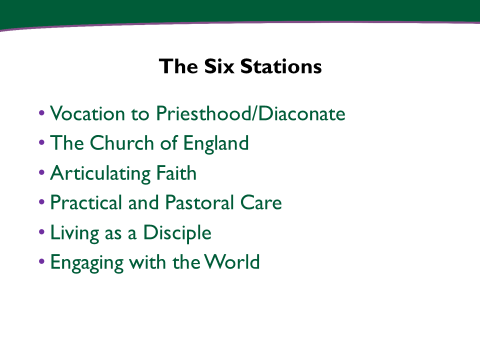
How will it work?
- Each conversation is limited to 15 minutes
- Stations will take different approaches, using a range of starting points, including: visual images, objects brought by the candidate, hymns chosen, video scenarios, current affairs, books read/films watched
- For some stations the candidate can undertake some preparation
- Others will require them to think more on their feet and to deal with the unexpected
- No writing will be required
What are the outcomes from these interviews?
- Outcome will be in the form of a report giving observations about the Candidate
- Advice back to Diocese will be about their readiness to proceed to Stage 2
- Candidates must attend Stage 1 to attend Stage 2
Between Stage 1 and Stage 2
Between the panels, the DDV will work with you to develop areas of weakness highlighted in Stage 1. They will also explore further the areas of the Qualities Grid not covered at the first panel.
Between Stage 1 and Stage 2 Panels, the DDV will ask you to meet with three Diocesan Assessors. These are three experienced lay or clergy people who will be from different churchmanship from each other. They will write a report for the DDV which will be passed to the bishop, but not submitted to the Stage 2 Panel (see below).
When the DDV considers you are ready, they will ask you to meet with the Sponsoring Bishop. (This is normally the Diocesan Bishop, but the role has been delegated at the moment to the Bishop of Wakefield, Tony Robinson). He is the one who makes the final decision about whether you can go ahead to train for ordination. He will do this on the basis of the report from the Stage 2 Panel.
Stage 2 Panel
The Stage 2 Panel is a two-day residential event at one of six venues around the country. It involves:
- Two in-depth ninety minute interviews, with two Bishop’s Advisors at each interview
- A group exercise with the other candidates, after which you write a short reflection about it
- Worship and meals together. All the worship is led by the Advisors.
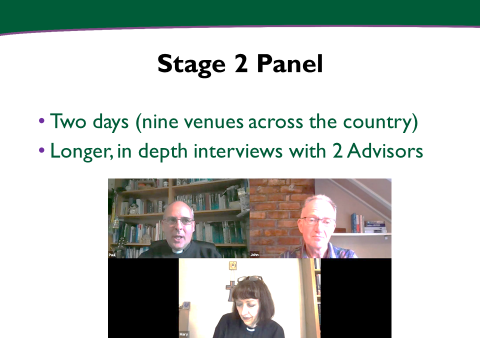
Outcomes
After the Panel, the advisors will prepare a report for the Sponsoring Bishop. There are five possible “outcomes” from the Panel, and the Bishop will use this feedback decide what happens next, in conversation with the DDV.
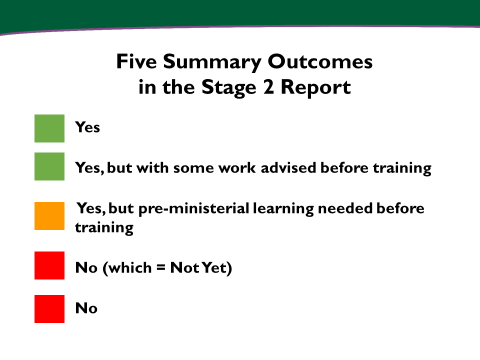
If the Stage 2 Panel does not fully recommend the candidate for training, the Bishop/DDV will consider the options for further work and development before training begins.
If the Stage 2 Panel report is a definite “no” then the DDV will work with the candidate to consider other paths and offer support as appropriate.
Normally, the Stage 1 Panels take place in September to February, and the Stage 2 Panels in March-July. Those recommended to proceed will commence training in September, though this can be delayed for a year if necessary.
